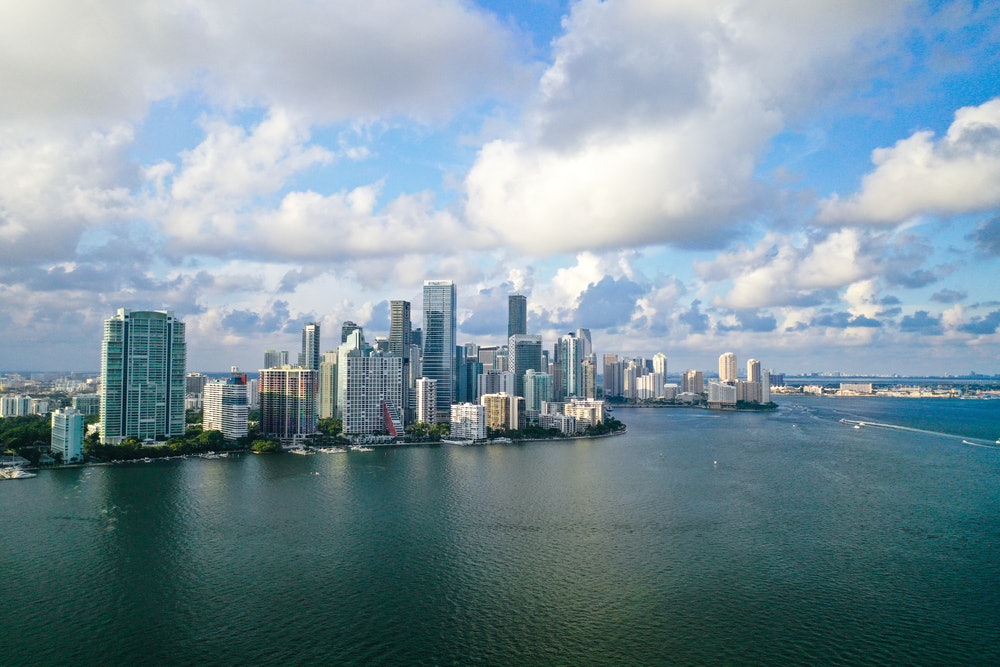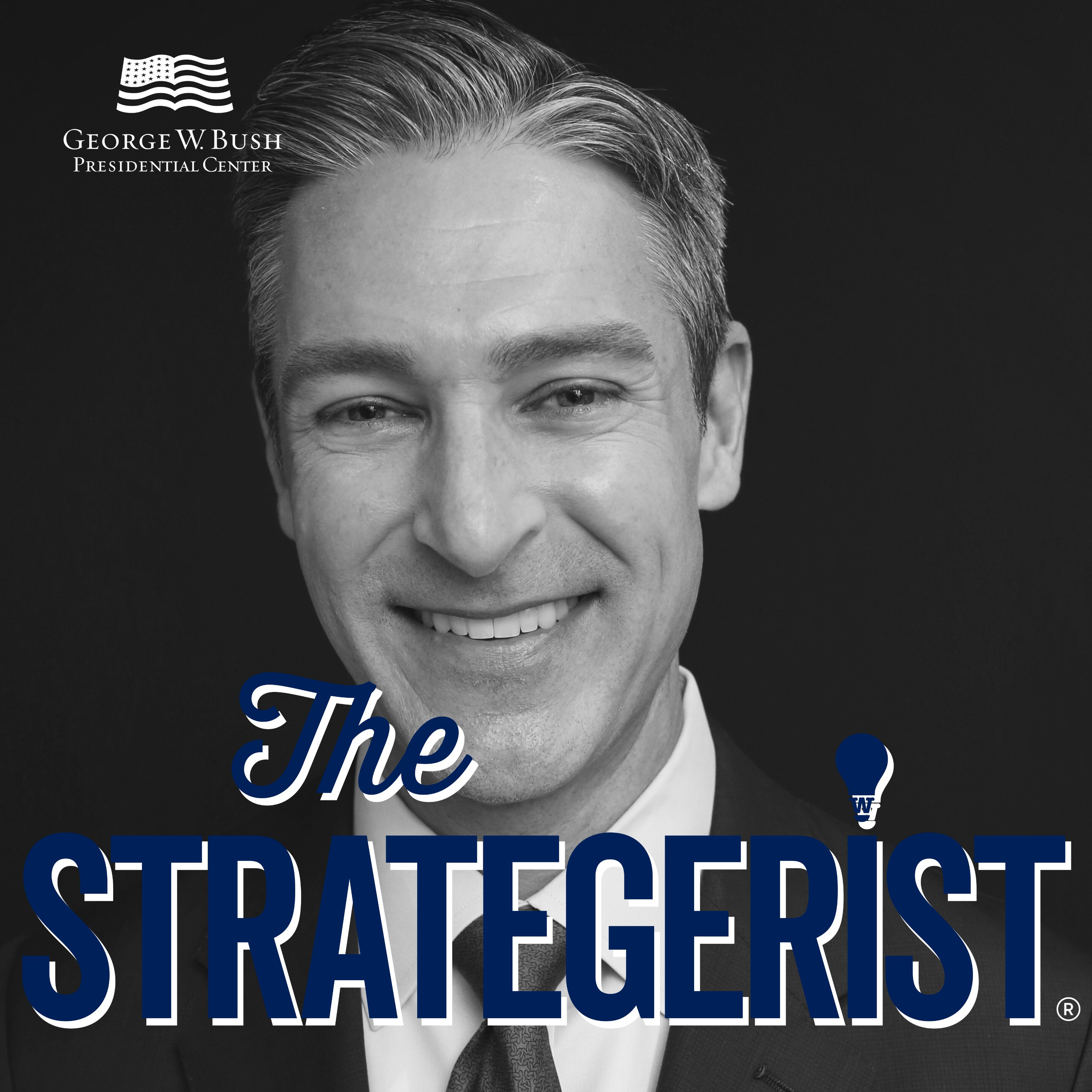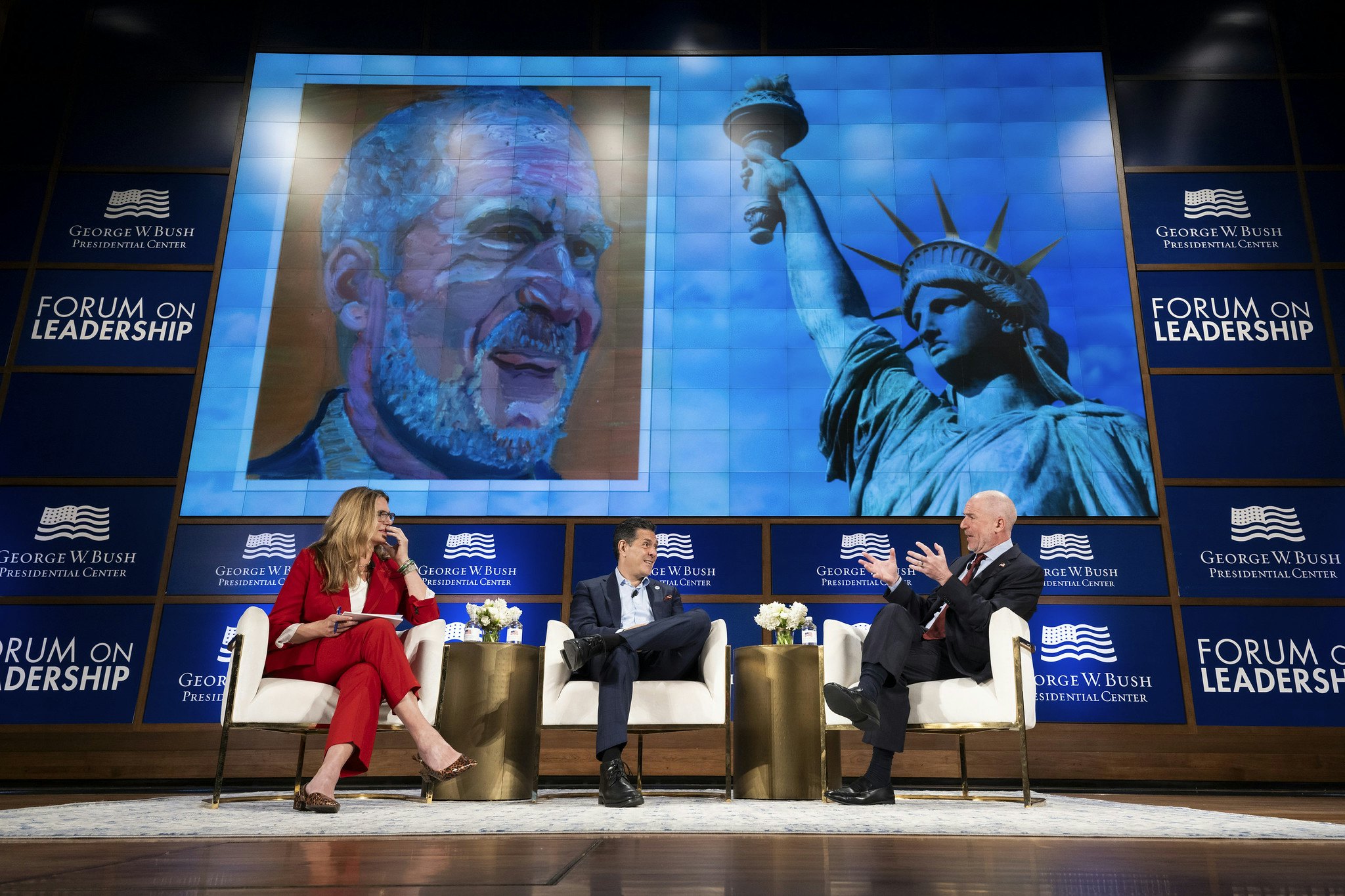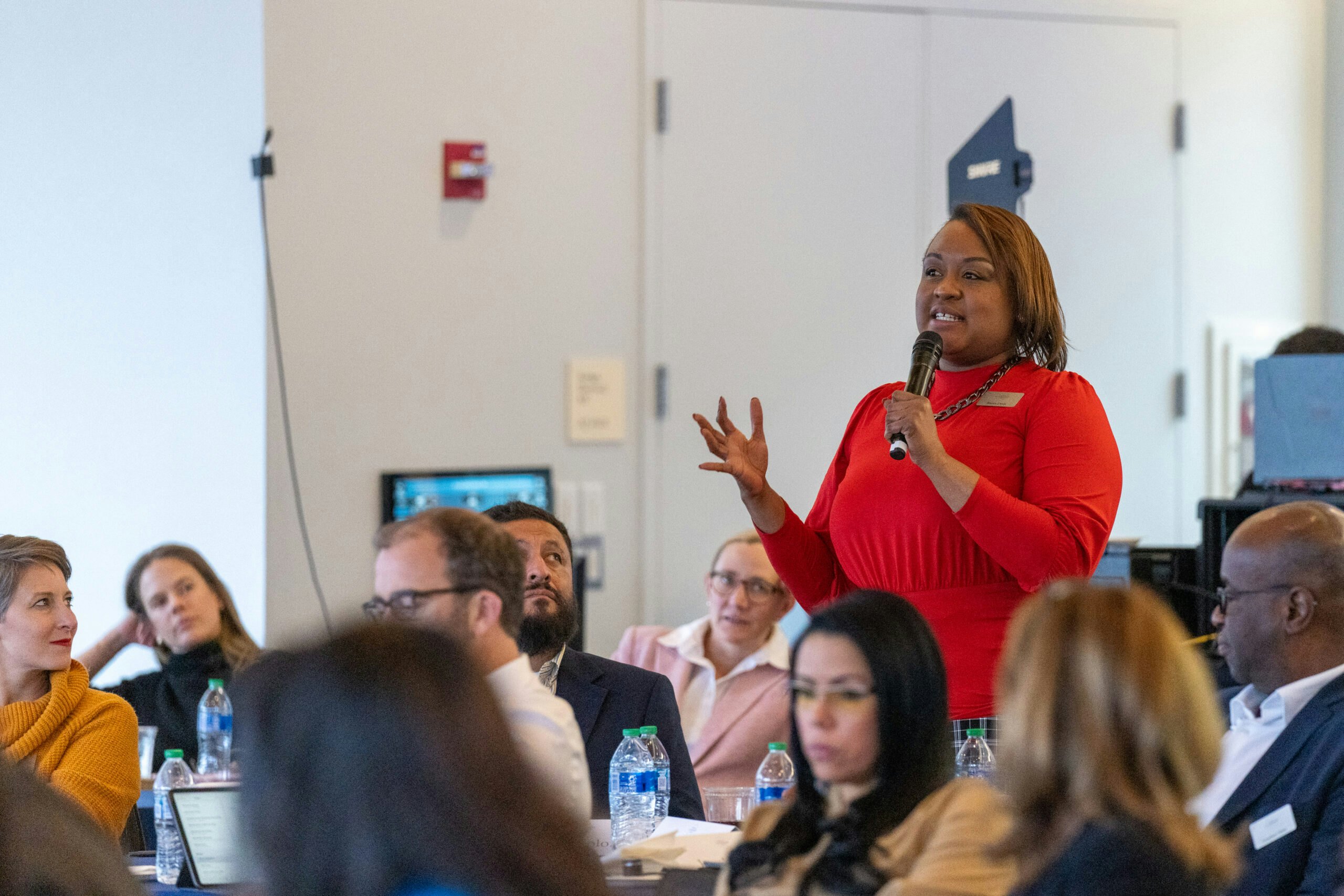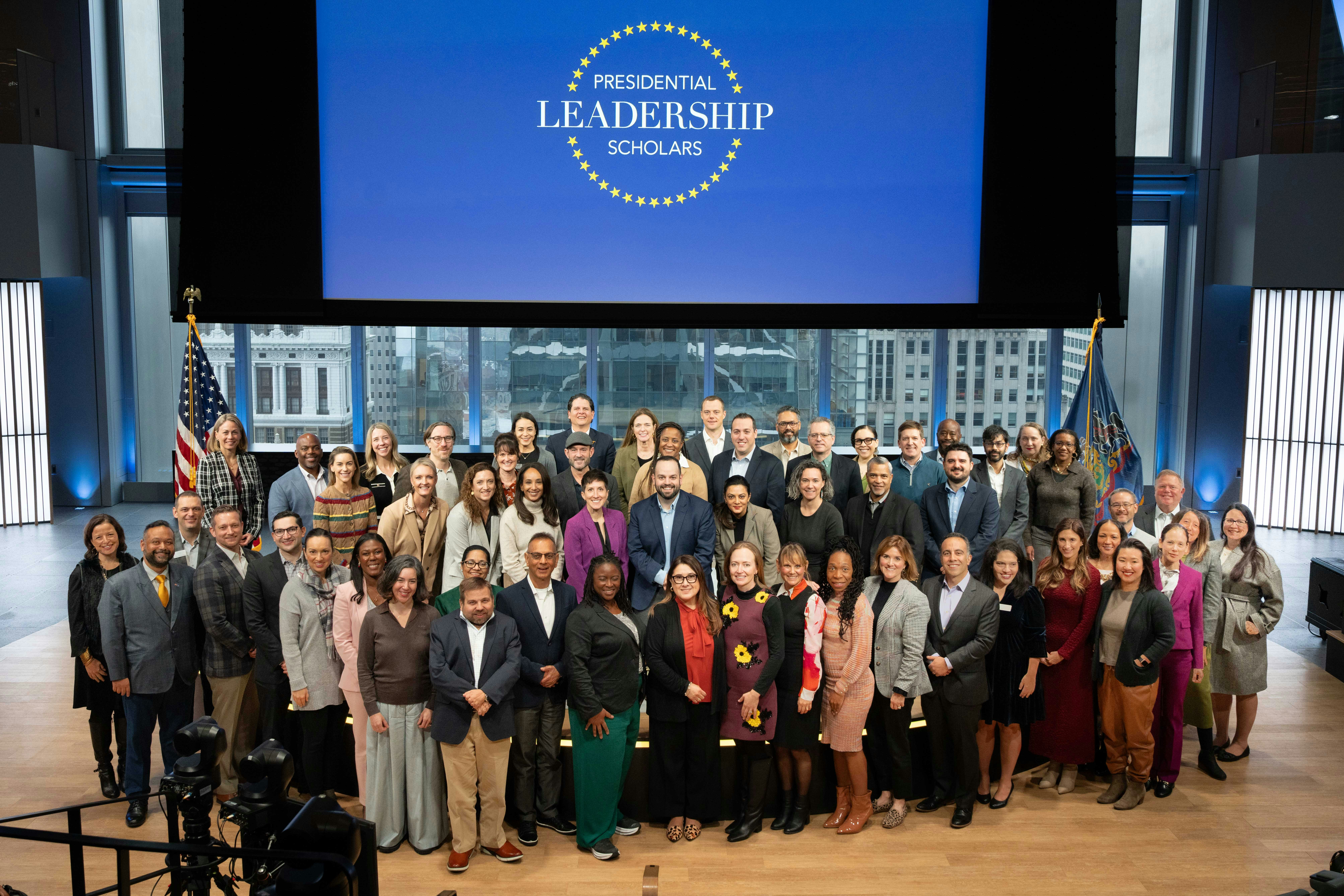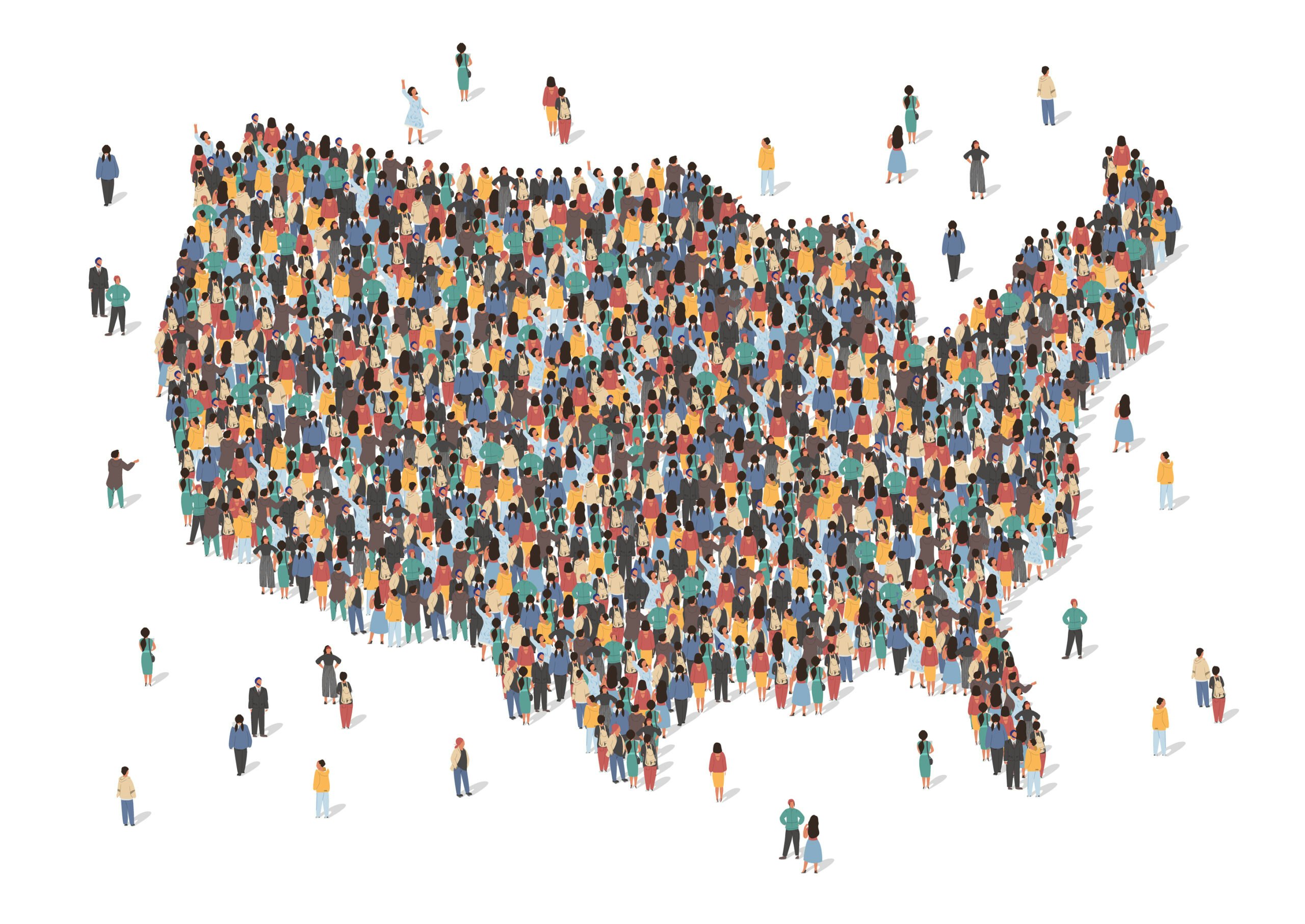Miami Mayor Francis Suarez shares how elected leaders can help their communities create a common story.
Francis Suarez serves as Mayor of Miami, a post the attorney has served in since 2017 and that his father once held. The Republican leader made a splash earlier this year when he launched a “How Can I Help?” campaign to answer a Twitter question about how Silicon Valley might be brought to Miami. Suarez, who serves as Vice President of the U.S. Conference of Mayors, believes that turning Miami into a technology hub is a key to strengthening his community.
In late May, the Florida International University and University of Florida College of Law graduate spoke about his goals with Chris Walsh, Senior Program Manager in the Human Freedom Initiative at the George W. Bush Institute, and William McKenzie, Senior Editorial Advisor at the Bush Institute. He also described how elected leaders can help their communities create a common story, including the essential role that quality schools play in creating a common purpose. In the accompanying video, you can listen to his observations about immigrants bolstering their communities.
Let’s start with the question we have asked all participants in this segment of Democracy Talks: How do you define civic engagement?
I define civic engagement in multiple ways. One way is about accessibility and being connected. And here is a good example: The way technology is today, with Zoom meetings, text messages, WhatsApp messages, and DMs, there shouldn’t be many barriers between elected officials and their constituents.
I put out a billboard in San Francisco trying to attract people to come to Miami. I said, “If you’re looking to move, DM me.” I got 3,000 DMs.
Elected leaders have a responsibility to stay plugged in and connected. When I was a councilman, I was able to press the flesh more, go to community centers, and be present physically. With the pandemic, and also being in a position where I now represent hundreds of thousands of people, I have to engage in a more macro fashion.
Being in the media and accessible to the media, as well as using social media channels, allow elected officials to communicate directly and instantly with their residents — and for free. In some ways, public officials can have larger channels than the press. You can define yourself and connect with your residents through those mediums.
As Vice President of the U.S. Conference of Mayors, you are in touch with local leaders. How can mayors best make civic engagement happen?
First, what’s important is that they engage. One of the big complaints is that officials are not accessible and not engaged. That leads to the conclusion that they don’t care. That is deadly when it comes to being a public official.
Authenticity and the feeling from your residents that you care about them are two of the most essential qualities for connections with your constituents. If those are missing, it’s very difficult to get things done and to have the confidence of your residents.
The “How Can I Help?” campaign of the last several months has been based on interacting with people on Twitter and on social media in a very public way. That is probably unusual, and it wasn’t natural for me. People often see those mediums as portals of negativity. But I was able to interact with residents who were acting in good faith.
You also have to learn how to block out the noise. One of the difficult components of being a public official now is the constant noise, the constant bashing, the dehumanization of elected officials by bloggers, by anonymous people. You have to find a way psychologically and spiritually to block out that noise and find the truth in sincere criticism, which is important.
You can’t always be drinking your own Kool-Aid. When someone’s sincere about a criticism, you have to take that in a reflective and contemplative manner. But, unfortunately, too many people spew hate and are negative and nasty and don’t have solutions. You have to deal with that part of it as well.
You can’t always be drinking your own Kool-Aid. When someone’s sincere about a criticism, you have to take that in a reflective and contemplative manner.
Speaking of that, you recently told Politico: “What I find complex about modern days is that we live in a polarized world, where people are constantly focusing on the things that divide them, instead of things that unite them.” So, how do leaders create a common purpose or common story about their communities?
Telling the story and having a common purpose is essential. I probably didn’t truly understand that until six months ago. If you don’t tell your story, somebody else is going to tell your story and you’re not going to necessarily like their version.
No matter the size of the city or community, it’s important that you’re constantly telling your story. No one is going to beat the drum for you. And you have to use all your channels.
If you look at Miami, we never have been on the radar for technology. But I started doing these long-form interviews that I call “cafecito tech talks.” I use them as a method to weave a narrative. And the narrative is that we are building the knowledge-based economy here and our children need to be prepared for it. If we didn’t tell that story over and over, we wouldn’t be able to change the reputation of our city as a place that’s just fun to visit as a tourist and then you go back to a place where you can do serious work.
We’re going to dig in deeper on technology but let me ask you another question about creating a common story and common purpose. What stands in the way of leaders and communities being able to knit together a common purpose or common story?
We live in a world where division often reigns. But you can create a common identity when you focus on values as opposed to politics. We all share similar values. We all want freedom. We all believe in family. We all believe in hard work. We believe in the American dream. Most of us should believe in immigration and in a path to success because everybody in this country is basically an immigrant at one point or another.
Our country was founded on those bedrocks. These are the principles that we as a community rally around. So rather than focus on a variety of very specialized topics, let’s focus on the things we have in common and get some things done. I think that’s what most of the residents of this country are looking for.
Let’s talk more now about technology. Miami is pushing hard to be a technological hub, much like Austin is here in Texas. But why do you see technology as a way to develop community? And what would you say about technology’s role in revitalizing communities to places in the nation that feel like technological advancements have left their industries so far behind that they can’t catch up to where that technology is going?
You have to start with the proposition that technology is here to stay, whether we like it or not. No one’s going to stop using their iPhones or computers. And the world is only going to become more immersed with technology.
As a city, you have two options. You can ignore technology’s role at your peril and get further behind. Or you can embrace it and find ways to create opportunities for all the children in your city to be successful.
That’s where the real work begins, creating the educational platform so that all children, no matter where they’re born, have an opportunity to gain the skills to compete in that kind of economy. They have to do the hard work. I don’t believe in equal outcomes. I believe in equal opportunity.
Then, we should be “up-skilling” or leveling up. People in this community have to understand or feel that they are part of this new economy. We have to give them an opportunity.
We have something in Miami called Wyncode that was just bought by BrainStation, an up-skilling company. We are investing strategically in that company as a city because we want to make sure that everyone in our city has a pathway to prosperity. That’s only going to happen if we make those kinds of investments and give people an opportunity to grow new skills and be part of this economy.
What other civic assets are key to revitalizing communities and engaging citizens with their communities? How hard are they to build and sustain?
Broadband and connectivity are incredibly important. We saw during the pandemic an exacerbation of the digital divide. Also, having the digital tools and a strong curriculum are key to integrating anyone into the digital economy and creating a platform for communication. When you think about community integration, you’re thinking about how we communicate.
I kind of agree with the current administration and the past one that we have to look at infrastructure differently. Infrastructure is no longer only roads, bridges. Infrastructure now is forming the human capital side of our country. It’s understanding that we’re competing in a world where oftentimes other countries are stealing our technology.
We’re in a hyper-competitive, disruptive world. The companies that are winning today may not be winning tomorrow. If you want any evidence of that, just ask a taxi driver how quickly their life could be disrupted and they’ll tell you.
The same goes for cities and countries. You always have to be competitive. Some of the policies from some of our cities and even our country don’t reflect that reality.
In terms of tapping the talent of your people in Miami to be part of this technological economy, how do you all engage schools and universities, including your recognized community college system? And what would you say to other communities about the importance of those assets?
I agree that our university system is much better than what it gets credit for. Part of that goes back to doing a better job of telling our story.
For example, FIU [Florida International University] graduates the most African American and Hispanic engineers in the country. It’s in the top 20 for filed patents. The University of Miami also has a great engineering college. And we’re starting to see the kinds of investments in our university system that other parts of the country see.
But our role is to push each other, not necessarily be cheerleaders for each other.
It’s hard to compete with universities that have endowments in the billions of dollars. We have to be conscious of that as we try to improve. I’ve been hammering that point home to the presidents of our universities. They’ve been accepting it pretty well.
In my humble opinion, the best investment that any city government can make is in education. The more you spend on education, the better off your population is in terms of their chances of being successful in the modern economy.
The best investment that any city government can make is in education. The more you spend on education, the better off your population is in terms of their chances of being successful in the modern economy.
For me, per capita spending is important. Coordinating is important. Pushing our institutions but doing it respectfully. I’m not trying to throw anybody under the bus. The point is to work together collaboratively.
I’m also encouraging and working on potential partnerships with some of our major institutions in Miami and some major institutions across the country and in Israel to make sure we don’t lose this generational opportunity for lack of momentum or because of a reputation gap.
Thinking about the nation’s polarization, what conditions make civil discussions happen?
Not watching so much cable news, maybe. Cable news stations don’t hide the fact that they have a particular slant, which in some ways is probably more intellectually honest. Sometimes, I watch the same news story on two different channels that are told from two different perspectives. It’s almost comical because you think you’re living in two different realities.
By the way, I go on all the stations: Fox, MSN, and CNN. They treat me well. They see me as someone who’s sort of no nonsense.
But it’s very understandable if people are falling into these categories and discussing issues based on what they’re watching all day long. As a society, we are going to have to tackle this issue at some point.
In the meantime, hopefully, leaders who are seen as problem solvers can help solve some of our problems and help us get a return on our investment. I can’t tell you the number of times I’ve been to Washington and have seen all the money that’s being spent and the little return on investment that we’re getting.
Being a problem-solver, as most mayors are, doesn’t mean that you’re not ideological or don’t have principles. It just means that your biggest principle is solving the problem, as opposed to trying to figure out who is to get credit for it, or who’s going to pat you on the back for it.
This is an ideological pragmatism. That is important because we’re not talking to each other, we’re fighting over everything. We can’t even agree on some basic things.

